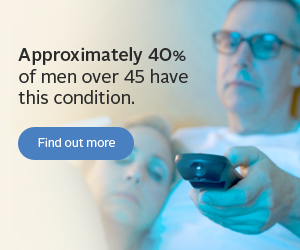Tips for getting the conversation started so you can start feeling like yourself again.
Low testosterone is nothing new to your doctor. He or she has likely seen many men feeling the same way you do, as about 45% of men over the age of 40 may be experiencing low testosterone.* There is no need to feel embarrassed about seeking help and getting the conversation started; it's your first step towards taking back control!
While the idea of talking about low testosterone can feel overwhelming and awkward, remember, your conversations with your doctor are strictly confidential and can put you on the path towards some lifestyle changes or treatment options that can have you feeling like yourself again.
If you think you may have low testosterone, you should make an appointment to talk to your doctor about it. If you can't schedule a time to talk about this issue alone, try bringing it up at the beginning of your next appointment to make sure you and your doctor have enough time to go through your options.
So, how do you break the ice? You may find it easier to talk to your doctor with some background information first. Try using the symptom self-assessment tool. Bring these results with you to your doctor's appointment to help get the conversation started.



